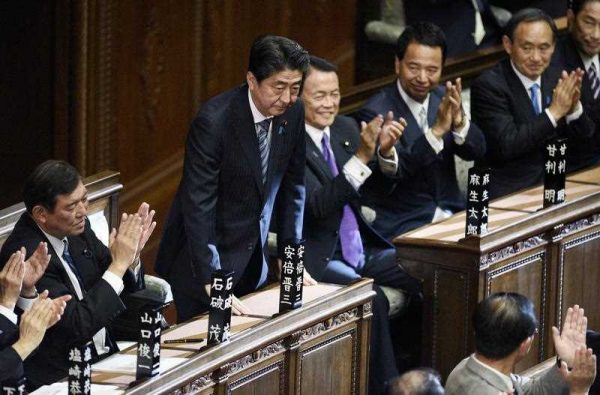While the Liberal Democratic Party (LDP) did not increase its majority in the Diet, the governing LDP-Komeito coalition maintained its two-thirds majority needed to get major measures through both houses of parliament. The election which nobody wanted to have achieved just what Abe wanted it to: ending up pretty well with what he virtually had status quo ante — a gain of just one seat for the coalition (326 as opposed to 325 in 2012), a marginal loss for the LDP (291 seats in 2014 compared to 294 in 2012) and a small gain for the Komeito, the LDP’s coalition partner (35 seats as opposed to 31 in 2012). In rallying to Komeito, the electorate appears to have put a moderate liberal brake on the shift to the right. The other big winner from the election, the Japan Communist Party (JCP), which more than doubled its seat tally to 21 in the lower house, now has 32 members in both houses of parliament and won its first single member constituency (in Okinawa) this time round.
Abe’s approval ratings, which had been on a downward slide, have levelled out since the election, though this is likely to be a temporary development unless he’s able to reverse the underlying corrosion of confidence in his ability to deliver on his policy agenda. Abe had a massive 70 per cent approval rate at the beginning of his term in 2012, largely founded on the promise of delivering a way out of Japan’s economic stagnation via ‘Abenomics’. The intervening two years saw his approval rating steadily drop to below 50 per cent with the Yomiuri newspaper poll just before the election registering a 42 per cent approval rating, a mere 3 percentage points above his disapproval rating of 39 per cent.
With confidence beginning to fracture in the delivery of Abe’s economic reform program and uncertainties about where Japan is being led politically — and the normal election term two years out — Abe’s hard political calculation was that it was better to start afresh and try again while you were still ahead than to hope for a turnaround in the next two years. This assessment proved absolutely sound. The Japanese electorate — or those who thought it worthwhile coming out to vote —had nowhere to go except stick with the ruling coalition.
While Abe has his substantial electoral victory, what is far less clear is what his mandate is and whether what those at home and those abroad hope of his administration can or will be delivered.
If Abe wasn’t exactly wowing the Japanese electorate with confidence in his ability to deliver his agenda last time round, has anything changed now the election is done and dusted? There are good signs and there are signs that are not so good.
If there were ever a time when a prime minister should have the clout to override special interests, one might have thought, this was, and still is, it. But so far Abe is showing little inclination to do so beyond paying the idea lip service. It’s not clear that a confirmatory victory can change things, and in their gut, experienced analysts think it’s unlikely. Economic figures continue to fall short of their targets and nothing less than a reversal in the outlook for recovery will lift the structural fall in Abe’s approval ratings over time. This will make him a nervous politician, exposed to more criticism from within and liable to resort to the old political games.
Abe’s interaction with President Obama at the Brisbane G20 summit (just before the elections) was defensive on US ambitions for a bold conclusion to the emblematic Trans-Pacific Partnership (TPP) negotiations. So, despite the promise of a shift in the politics on the US side, US-Japan negotiations could still flounder.
The TPP also plays directly into the challenge of building confidence in the Japan–US alliance relationship. As Nobumasa Akiyama argues in this week’s lead, there is the problem of dealing with the relocation of the US Marine Corps Futenma Air Base in Okinawa, resolution of which has not been assisted by the election outcome. As Akiyama explains, the ‘LDP was defeated in all four districts in Okinawa because of the issue of the base relocation. The frustration among the people in Okinawa is mounting. Abe must devote himself to closing the widening gap between Tokyo and Okinawa’. Failing to address the issue will undermine the confidence of Abe’s commitment to the alliance.
The atmospherics of the alliance relationship could also be affected by the way in which Abe deals with the 70th anniversary of the end of the Pacific War. Japanese diplomatic efforts in the past weeks to browbeat US publishers on textbook references to the ‘comfort women’, the Sea of Japan (East Sea) and even the Nanjing Massacre don’t bode well for the handling of this highly sensitive issue. If Abe is to reconcile and balance the domestic pressure from his nationalist political supporters with international expectations, as Akiyama says, he will need to expend political capital. But it should be politically easier for Abe, whose sympathy for the nationalist cause is well-known, to do this than for most other Japanese leaders — assuming, that is, that his political base would not desert him.
Friends and allies of Japan, like Australia and the United States, have put big bets on Abe playing their game, economically and politically. Whether these bets pay off will depend very much on whether the tactical politics of securing the second term presidency of his party (in September this year) and eventually the chairmanship of its Constitutional Research Committee (in 2018) don’t overwhelm the more important strategic policy decisions that now demand his action.
Peter Drysdale is Editor of the East Asia Forum.

